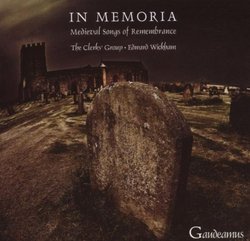The Music of the Spheres ...
Giordano Bruno | Wherever I am, I am. | 01/27/2010
(5 out of 5 stars)
"... was not just a trite metaphor in the 15th Century, when mysticism and mathematics were inseparable. Music was, in a sense, God's own language, an expression of the fundamental Order and Hierarchy of Being. 15th C scholars still grouped their studies into 'quadrivium' and 'trivium', and the four higher studies were: arithmetic, geometry, astronomy, and music. Some sense that they were conversing with the elemental Rule of the universe must have suffused the lives of the great composers of 15th C polyphony; their music was truly intended for God's ears, and their understanding of musical proportions was tantamount to a personal Revelation.
At least, so I imagine, 600 years later. Guillaume Dufay, a career cleric as much as a composer, surely had a mystical conviction that Music was his special communication with God. In full knowledge of his approaching death, Dufay retexted his own antiphonal motet "Ave regina coelorum" with words of a personal prayer for mercy, stating his own name. He requested that the choir boys of his ecclesiastical community sing that motet around him as he lay dying. He also, by the way, left bequests for the choirboys and asked in his will that they pray for him in perpetuity.
That "Ave regina" is one of the requiem compositions performed on this CD of poignantly beautiful and intensely human polyphony. Also included are:
Johannes Ockeghem's requiem chanson for his fellow composer Gilles Binchois: "Mort tus as navre"
Josquin des Prez's requiem motet for composer Jacob Obrecht: "Absolve quaesemus"
Josquin's ethereal lament over the death of Ockeghem: "Nymphes des bois"
Obrecht's musical memorial for his trumpeter father Willem: "Mille quingentis"
But composers also expressed sincere grief and religious expectations for the people who often meant the most to them -- their patrons. Johannes de Sarto's "Romanorum Rex" is a tribute to his patron Albrecht II. Pierre de la Rue's French chanson "Cueurs desolez" uses the 'dies irae' sequence of the liturgical requiem mass as its tenor; the chanson was probably written to honor the death of Jean de Luxembourg, of the extremely pious court of Margaret of Austria. Heinrich Isaac's "Quis dabit capiti meo aquam" -- the most celebrated composition of this selection -- is a dirge for the death of Lorenzo de Medici in 1492, with a text by the famous poet Angelo Polizano. All of these 'memorials' are framed, in this performance, by sections of the requiem mass, the Introit, the Gloria, and the Gradual, in Gregorian chant or troped chant. But there's a human depth of sorrow in this music that transcends the orthodox impersonality of liturgy. These composers were praying for their own souls.
The ensemble here is The Clerks' Group. I hardly need to offer a higher recommendation than that. The clerks are only six in number - altos, tenors, and basses - on this CD, which was assembled from recorded sessions over a span of several years. I'm undoubtedly being 'subjective' here, but my ears tell me that this music was as emotionally powerful for the six singers of the first decade of the Third Millennium of Christianity as it was for the fervent composers of the 15th C. For musicians, music is still the language of the Universe."


 Track Listings (14) - Disc #1
Track Listings (14) - Disc #1